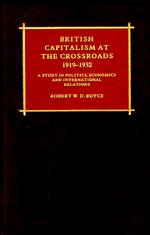 British Capitalism at the Crossroads, 1919–1932
British Capitalism at the Crossroads, 1919–1932 Book contents
- Frontmatter
- Contents
- Preface
- List of abbreviations
- Introduction
- 1 THE POLITICS OF ECONOMIC INTERNATIONALISM
- 2 CRUCIFIED ON A CROSS OF GOLD
- 3 ‘NORMALCY’
- 4 CONFLICT OVER COMMERCE
- 5 THE SCRAMBLE FOR GOLD
- 6 THE SECOND LABOUR GOVERNMENT AT THE HAGUE
- 7 FREE TRADE: THE LAST OFFENSIVE
- 8 THE CHALLENGE OF REGIONALISM
- 9 THE GOLD STANDARD UNDERMINED
- 10 THE AUSTRO-GERMAN CUSTOMS UNION CRISIS
- 11 THE COLLAPSE OF ECONOMIC INTERNATIONALISM
- Conclusion
- Notes
- Bibliography
- Index
- Frontmatter
- Contents
- Preface
- List of abbreviations
- Introduction
- 1 THE POLITICS OF ECONOMIC INTERNATIONALISM
- 2 CRUCIFIED ON A CROSS OF GOLD
- 3 ‘NORMALCY’
- 4 CONFLICT OVER COMMERCE
- 5 THE SCRAMBLE FOR GOLD
- 6 THE SECOND LABOUR GOVERNMENT AT THE HAGUE
- 7 FREE TRADE: THE LAST OFFENSIVE
- 8 THE CHALLENGE OF REGIONALISM
- 9 THE GOLD STANDARD UNDERMINED
- 10 THE AUSTRO-GERMAN CUSTOMS UNION CRISIS
- 11 THE COLLAPSE OF ECONOMIC INTERNATIONALISM
- Conclusion
- Notes
- Bibliography
- Index
Summary
The Conservatives' dilemma
The main challenge confronting the Conservative government from its formation on 7 November 1924 was the heavy unemployment in the depressed export industries. The government commanded no less than 419 out of the 615 seats in the House of Commons; yet it was to prove almost wholly incapable of assisting industry or reducing unemployment, due to divisions within the Cabinet and the country.
Stanley Baldwin, Prime Minister for the second time, was before all else a politician, for whom politics were less a means to an end than an end in itself. For nearly twenty years prior to entering Parliament he had been a director of Baldwin's Ltd., the family-controlled iron, steel, and coal firm in Worcestershire. His father, in many ways typical of successful manufacturers of his time, had begun life as a Methodist and acquired a modest technical education at the Wesleyan College in Taunton; later, with his firm well established and his wealth secure, he abandoned Methodism for the Church of England and entered Parliament as a Conservative. His son was sent to Harrow, then to Cambridge. Spiritually it was a voyage from which he never returned, for having mixed with the scions of landed and financial wealth and tasted the pleasures of cultivated society, the life of a provincial industrialist held little appeal for him. Stolidity and a strong sense of filial duty kept him at it while his father lived.
- Type
- Chapter
- Information
- British Capitalism at the Crossroads, 1919–1932A Study in Politics, Economics, and International Relations, pp. 79 - 100Publisher: Cambridge University PressPrint publication year: 1988


